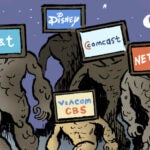Here’s today’s AdExchanger.com news round-up… Want it by email? Sign up here.
Dos Va Donya
IPONWEB founder and CEO Boris Mouzykantskii published an open letter and update on the company’s actions since the start of the war in Ukraine.
There was theoretical concern the war would be a wrench in the $380 million acquisition of IPONWEB by Criteo, which was announced in December and set to close in Q1 this year (tick, tick, tick). Mouzykantskii is a native Russian (then the Soviet Union, actually), and IPONWEB’s R&D group has been based in Moscow for the past 20 years.
“But now, operating an R&D center in Russia has gone from being complicated to being completely untenable for a global company like ours,” he writes.
Mouzykantskii says the company is offering relocation assistance for employees and their families who decide to leave Russia. Thirty percent of IPONWEB’s Moscow-based team has relocated. “Our teams have worked diligently and behind-the-scenes to protect and assist our colleagues as they look to relocate and navigate the complexities of establishing a new life in a new place,” Mouzykantskii writes.
The company will also expand its Berlin office, now the European hub of its product and engineering efforts.
Sharing Isn’t Caring
Netflix’s cheapest plan costs $9.99 per month. The “standard” plan (which carries HD) is $15.99. No wonder people share accounts.
But Netflix is testing a tool to force cardholders to pony up when their account is used regularly outside the paying household, Variety reports. The tool will be tested in Costa Rica, Chile and Peru.
Last year, Netflix tested a verification tool prompting users outside the household for account credentials and a code.
Netflix’s new anti-password-sharing test will offer two options: Pay more or kick non-household freeloaders off the account.
It’s little surprise Netflix is getting aggressive about password-sharing solutions. The big telco and broadcast streaming players all have AVOD apps – and other revenue streams – so they can float losses on subscription prices (to an extent). Netflix, on the other hand, needs to wring every cent it can out of subscriptions to avoid having to fall back on ads.
Netflix raised subscription prices by $2 per month in January. The higher its subscription, the further the pendulum swings toward account-sharing enforcement.
Fraud … Still Not Good
Advertisers are testing alternatives to linear TV more than ever right now. But programmatic video – which has a bad-enough rap already – is dealing with high levels of fraud that discourage more advertisers from jumping in.
The crazy-high CPMs for high-quality video or OTT ads (which can still be served to a phone or web browser) are a beacon for online fraudsters.
There are still programmatic guaranteed deals and private marketplaces where ad tech companies are trafficking legit video inventory. But the open marketplace has really suffered when it comes to fraudulent inventory, Digiday reports.
That dynamic is tough for advertisers, because it forces them to plan campaigns network by network and platform by platform, with no way to scale up other than try the next walled garden.
“We’re saying let’s push this to programmatic guaranteed … then we can optimize the rest of the buy,” says Megan Pagliuca, chief activation officer at Omnicom Media Group. “We think with the launch of clean rooms, we can pull analytics into those clean rooms to inform [this type of] investment in a smarter way.”
But Wait, There’s More!
Warehouses transform NYC neighborhoods, home to the world’s largest concentration of online shoppers. [NYT]
WPP is the latest holding company to partner with Reddit. [Adweek]
Video game publisher DeepWell is going for … FDA-approved health benefit labels. [Axios]
Meta has introduced parental controls for Instagram and Oculus Quest. [Protocol]
Google allows free hotel booking links to level the playing field … a tad. [Skift]
You’re Hired!
The digital consultancy Bounteous has added multiple new managing directors. [release]














